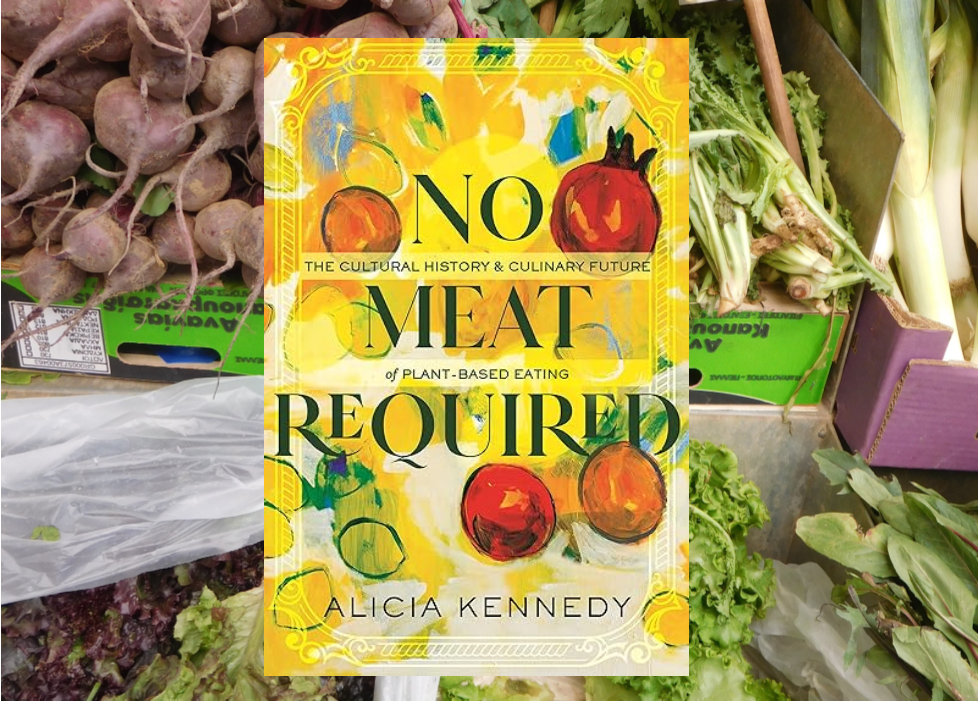When we’re talking about strengthening regional food systems away from overly efficiency-driven, scale-driven, growth-driven profit motives, then we’re talking about: What is the best thing for this ecosystem? How do we protect the workers’ rights who are part of this system? How do we make locally grown seasonal food both abundant and accessible to folks? Part of a plant-based ethos is to get away from the corporate control and lack of transparency when it comes to the food system.
— Alicia Kennedy, interviewed at Vox.
My upbringing amid the barely civilized wilds of Southern Indiana came with an expectation that daily meals would include a large proportion of meat, drawn from a broad spectrum of carnivorous options, including mystery meat (sausage, bologna, hot dogs), pork (bacon, chops and ribs, the latter customarily decimated in a pressure cooker), chicken (never baked or roasted, but fried), turkey (only at Thanksgiving) and occasionally venison harvested by my father during his hunting trips to Wyoming, although my mother didn’t like the “gamey” flavor all that much, so usually we’d end up giving most of it away (although later I discovered that ground venison was great in moussaka).
But no other flesh was as important to my family’s belief system as beef, which was a constant, as representing both calories and symbolism.
My father attached a level of religious significance to beef, perhaps owing to a hardscrabble childhood during the Great Depression, and whether it meant slaughtering our own cows or buying beef at the emerging entity known as the supermarket, steaks grilled over charcoal were a Saturday evening staple, proving to my dad that he had in fact “made it” in life. Burgers, beef stew and rump roast completed the weekly menu cards.
The overarching point is that my father’s ironclad fondness for meat (and taters) set the culinary tone in our household, and my mother, who as a home economics teacher actually taught cooking to high schoolers, either couldn’t or wouldn’t expand the narrow perimeter of proteins.
Fortunately, sensing quite presciently that her son was born to be a contrarian, omnivore and trencherman—not necessarily in that order — she was available to advise me as I became interested in cooking dishes that were unobtainable locally at the time, as with the aforementioned Greek casserole dish.
It took a very long time for me to take the step of examining my consumption of meat, and significantly, health considerations had almost nothing to do with it.
I’m fortunate to possess a constitution sufficiently robust to withstand the Falstaffian-levels of food, drink and dissipation foisted on it over the decades, but beginning in the late 1990s, I became convinced that a sort of vegetarianism in relative terms was my ultimate destination.
My conclusion? At some point in the future, I’d awaken one morning to grasp the efficacy of ethical arguments against killing so many sentient beings for food. Perhaps finally brought to the forefront by the pandemic, this alarm bell duly clanged in early 2021, and since then I’ve dramatically reduced the amount of red meat and fowl I ingest, while not eliminating it from my daily diet entirely.
Fish and dairy remain components of the regimen, although not milk, which I regard as vile and indefensible. My approximate template resembles a “Mediterranean” style of consumption, primarily pescatarian, with red meat and fowl relegated to scattered cameos. I have no illusions about this or any other “diet” as such, but Mediterranean food in its broadest sense is pleasing to the palate and lends itself to meatless interpretations.
I’m convinced by the historical record that throughout modern eras of humanity, when my ancestors often did exist on bread alone, meat was limited to a saint’s feast days and special occasions.
In addition, I’m convinced that a global agricultural system geared to the factory farming of animals and their assembly-line slaughter is harmful to the health of the planet, as well as to its individual human occupants.
You’re to be spared a discussion of economics, although it will suffice to say that if governmental subsidies disappeared, and prices reflected reality, we’d all be singing different songs and maybe rethinking this notion of test-tube meat absent partisan politics.
Edibles & Potables: On having a BEEF with “petri dish steaks”
Couple all this with an evolving ethical consciousness pertaining to animal rights, and that’s the gist of my stance. Speaking personally, I’m trying to contextualize red meat and fowl, with the ultimate goals of reducing their presence on my plate, and when finding them before me, ensuring their origins are local as often as possible.
However — and echoing what Alicia Kennedy writes in her book No Meat Required — an important aspect of my journey is an accompanying resolve to avoid transforming my choice of edibles into an opportunity to wax evangelical (something I’ve taken great pleasure in doing during a career in beer, and see no reason to foreswear).
Kennedy is interested in making a case based on history.
“In No Meat Required, author Alicia Kennedy chronicles the fascinating history of plant-based eating in the United States, from the early experiments in tempeh production undertaken by the Farm commune in the 70s to the vegan punk cafes and anarchist zines of the 90s to the chefs and food writers seeking to decolonize vegetarian food today.”
I recommend Kennedy’s book, and she can be found online here. Following are a handful of links to familiarize you with her oeuvre.
- Alicia Kennedy on publishing (her) book (the paperback edition is out on Tuesday, June 25);
- Alicia Kennedy’s No Meat Required Is Out to Challenge Your Preconceptions About Plant-Based Cooking, by Emma Specter (Vogue)
- ‘No Meat Required’ Finds Optimism and Abundance in Meat-Free Cooking, by Bettina Makalintal (The Eater)
- How Alicia Kennedy Became a New Type of Food Writer, by Bianca Betancourt (Bazaar)























